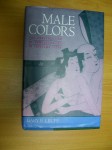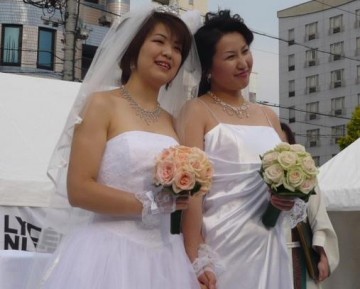06 June 2007
Japan's crazily advanced gay movement
Can you believe this is happening in our country? Most conservative among advanced nations.
The couple is not just lesbians that you can normally see in SOHO in NY or Castro Street in San Francisco.
A woman on the left is Ms. Kanako Otsuji, former member of Osaka prefectural assembly. Now she is running in upcoming nationwide election campaign as candidate for the second largest political party, Democratic Party of Japan.
She came out as lesbian two years ago while she was a member of the assembly.
On this wedding she received the congratulatory message from the party leader, Ichiro Ozawa, known as conservative type of politician. Wow, what is happening in Japan?
Well, as I wrote on this blog, our society used to be very open-minded to gays. We were very free sex nation.
But since westerners came in late 19th century, our view of sexuality has drastically changed.
We may be moving backward.
21:25 Posted in Japan News | Permalink | Comments (0) | Tags: gay, lesbian, Japan, homosexuality
24 May 2007
TV Mini-Series "Shogun" God Cursed Sodomite!
I rent DVD of TV Mini Series "Shogun" aired in U.S., 1980. I remember when I first visited the U.S., American host family where I stayed played the video of this show to welcome me. It was a very popular show. So I just wanted to see it again.
The story takes place late 16th century in Japan, when Japan was not unified. An English shipper captain, John Blackthorne was saved by the Samurai Lord, Toranaga after his ship was wrecked by the heavy storm. Blackthorne then learned how to become Samurai. Later Toranaga became the shogun, the general who governs whole of Japan. Toranaga is actually named after Tokugawa Ieyasu, who founded Tokugawa dynasty that continued for 2 and half century just by his descendants.
It was almost 10 hour show. I enjoyed only first 2 hours. As for rest of the show, I fast forwarded just to see how Japan was depicted. More than half of the show was spoken in Japanese. I could not understand how American viewers could enjoy it although each Japanese conversation was interpreted by Japanese care taker woman for Blackthorne. Kind of frustrating to see for the English viewers, I wondered. But there are many new and exciting things introduced in the show especially for westerners such as Harakiri, a man and a woman taking bath together. Not common in modern Japan but typical and normal in that era.
There was a very interesting thing even for Japanese. That proves that sometimes foreigners know better of our country's history. In the scene, Japanese care taker woman named Mariko told Blackthorne that he should choose a woman to sleep with for his health. Blackthorne declined. Then Mariko said "Do you prefer a boy?"
He was so shocked and got angry and then said "I am not God Cursed Sodomite! My intimate customs doesn't include boys." I was surprised, too. But the truth is in that era, Sodomite was considered normal in Japan.
If you want to know more about that, please read this post.
21:00 Posted in Film | Permalink | Comments (0) | Tags: japan, samurai, gay, homosexuality, tv
12 May 2007
Learning Japan's hidden history by American scholar
Male Colors: The construction of homosexuality in Tokugawa Japan
by Gary P. Leupp, Professor of Japanese History at Tufts University, USA,
I happenned to buy this book almost ten years ago in America.

Before reading this book, I had thought it unlikely that there was any homosexuality in Japan . I also took a negative view of homosexuality, seeing it as a result of the decadence of Western culture. When I came across this book, while in the USA , I was therefore astonished to learn about an aspect of Japanese history about which I, a Japanese, knew nothing.
The book is primarily concerned with male homosexuality in Japan during the Edo Era. However, the Introduction also mentions nanshoku (literally, “male colors”), as the practices of homosexuality and pederasty were then known, as it was prevalent at earlier times. It is said that Kūkai a monk who introduced Buddhism to Japan from China brought the practice of nanshoku, and it was at first mainly among monks that the practice spread. However, during the Age of Warring States (16th century), nanshoku became extremely common among men of the samurai caste. Historical records show that famous samurai lords such as Oda Nobunaga and Takeda Shingen, for example, had sexual relations with their retainers, and there still exist documents showing that Takeda Shingen and his vassal Kosaka Masanobu wrote pledges of sexual love to each other.
After the years of war and chaos, the Edo Era (1603-1867) began with the Tokugawa Shogunate establishing its rule over Japan . However, the Nanshoku Culture continued, and records show that 7 of the 15 Tokugawa shoguns engaged in homosexual activities. Homosexuality was not restricted to the samurai, but was prevalent among the ordinary townsfolk as well. At that time, nanshoku was classified as two main types. In the first type, a couple of men with a marked age difference were seen as having a relationship modeled after older and younger brothers. The second type, on the other hand, was influenced by the male-chauvinist perspective of contempt for women, and one partner took the female role, enabling two men to imitate a heterosexual relationship without having to lower themselves to sexual contact with impure females.
Ihara Saikaku famous novelist in that era, wrote Kōshoku Ichidai Otoko (The Life of an Amorous Man) which is representative of the practice of nanshoku among the common people. The principal character, Yonosuke, the son of a rich merchant, has sexual intercourse with 3,275 women and 725 men during the course of his life. That is a ratio of 5:1, but it probably reflects the general male sexual orientation at the time. To summarize, homosexuality was not a minority concern in society during that era, and the typical male sexual orientation was what would now be termed “bisexual”.
The above information raises the question of why Japan changed so drastically to a society in which homosexuality is regarded with loathing. Leupp indicates the process of modernization during and after late 19th century known as Meiji Era as the cause of this. After Japan opened up to the rest of the world, many Westerners visited Japan and transmitted aspects of Western culture, one of which was severe criticism of the Japanese nanshoku Culture. The ruling and influential classes at that time had great concern about such hostility, and started to insist that nanshoku was morally wrong, in order to bring Japan into line with the Western system of values.
However, a great change can now be seen to have taken place in Western society. In Europe, the USA, and some other countries, the Gay Liberation Movement has been successful in recent years, and in some European countries and some US states even homosexual marriage is now accepted. In other words, Westerners, who introduced loathing of homosexuality to Japan , as part of “modern culture”, have now reconsidered their own value systems. These are certainly curious times in which we live!
Leupp also points out that, in terms of the main currents of society, nanshoku in pre-modern Japan offers a good historic example for discussion about homosexuality. Homosexuals are now generally considered to be a minority of the population, making up 2% to 5%, or perhaps 10%, of the total. However, at least with respect to Japan during the Edo Era, it is difficult to see this as being the case. At that time, Japanese men seem generally to have been bisexual. To conclude, this book suggests that human sexuality is neither innate nor created by a particular family environment, but is a product of the wider society.
It is not just a history of Japan but whole humanity, isn't it?
22:20 Posted in Books | Permalink | Comments (0) | Tags: gay, japan, homosexuality, history
25 April 2007
Gay Issues in America, what I learned
When it comes to homosexuality, the entire American society is softening up in recent years evidence of which can be seen in the revisions in the legal systems of several states that have made possible the union of gays in matrimony or some other partnership arrangement. Also, movies like “ Brokeback Mountain ”, which brings homosexuality to the fore for all to see, are getting rave reviews thus demonstrating a trend that sees the lessening of bias and prejudice.
I had lived in San Francisco, a city known to be one of the US’s most liberal cities, during a popular movement that would brand it as the Gay Capital . With most inhabitants of that city tolerating homosexuality, when I spoke harshly about gays usually they shunned me .
I met with some gay liberation activists in that city and asked the following questions.
-Children cannot be born from gay sex, therefore, it is against the laws of nature and accepting it would imperil the humanity. What do you think of this?
Humans engage in sexual activity not for procreation but for pleasure. Sex without the intent of making children is practiced equally by heterosexuals as it is by people who have lost their ability to reproduce as well as those practicing birth control. Also, with the explosion of worldwide population in recent years threatening the very survival of humankind, all those “pro-lifers” now have it wrong.
-Isn’t homosexuality forbidden by Christianity?
Christianity is but one of many religions and there are many followers of Jesus that are gay. In the Old Testament, it is written that sex between same-gender individuals is behavior punishable by death. However, in the very same book, it also says that those who work on the Sabbath Day and those who wear clothes made with a mix of different fabric are to be condemned. There are many “Commandments” that just make no sense in this day and age. The Bible in its present form was compiled in the Middle Ages and, since we know that Jesus Christ himself never said anything homosexuality, it cannot be definitely asserted that Christianity forbids it.
-Isn't homosexuality mental disorder that ought to be cured?
In the US, psychiatrists and psychologists have agreed back in the 1970s that homosexuality is not an illness. The behavior itself is between consenting individuals and does not pose a threat on others. It is not scientific to brand perfectly sane individuals as neurotic only with respect to sexuality and nothing else.
-Why do people become homosexual?
Many say that it is a product of the environment in which one is born, however, in actual fact, no one really knows why. This can also be said of heterosexuality. It is not scientifically proven why men love women and women love men. It is in the quest for a reason for this that one encounters the belief that homosexuality is abnormal behavior.
-So, why is society regarding gays as outcasts?
A major factor is the fact that statistically gays are a minority. But aside from this, it is the general repulsion of the sexual act itself by society. Sex is regarded as impure not just between gays but also between straights. This is why virginity is revered as a virtue. However, if no sex occurs between members of the opposite gender, humanity will be extinct. This is where the notion that only heterosexual love for the intent of reproduction is accepted as holy and sex for the purpose of sheer pleasure becomes regarded as sinful. And, not only homosexual love but all sex performed with, for example, a condom or some other form contraceptive is also seen as a sin.
What do you think?
21:15 Posted in Society | Permalink | Comments (0) | Tags: gay, Christianity, homosexuality






